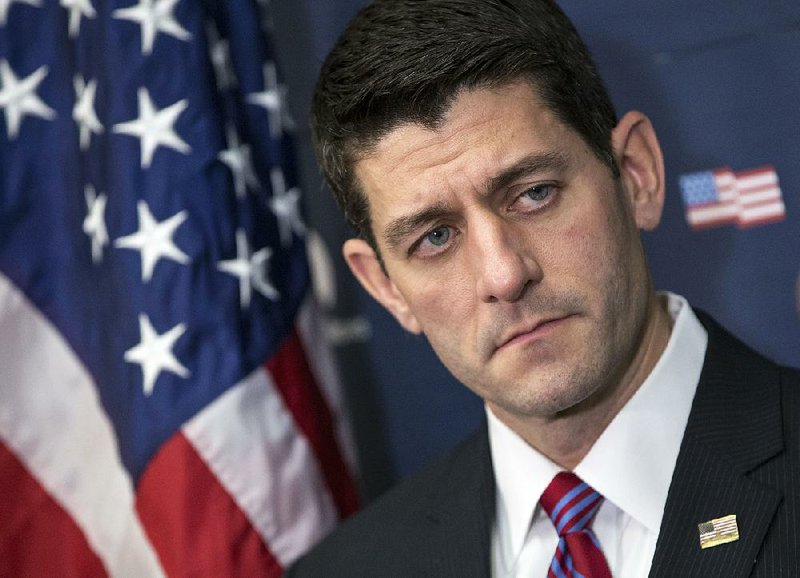WASHINGTON -- Congress sent legislation to President Barack Obama on Wednesday that would repeal the 2010 health care law, fulfilling a promise to Republican voters in a presidential election year but inviting a certain veto.
The nearly party-line vote in the House was 240-181. Arkansas' four representatives, all Republicans, supported the bill.
The legislation, HR3762, passed the Senate last year under special rules protecting it from Democratic obstruction, so it goes straight to the White House.
Obama has said he'll veto the repeal measure, and Democrats in each chamber have enough votes to block an override by the Republican majority.
Republicans, who control both chambers in Congress, boasted of a signal achievement, saying they were forcing Obama to face up to the failures of his law while illustrating the stark political choices voters face.
"We are confronting the president with the hard, honest truth," said Speaker Paul Ryan of Wisconsin. "Obamacare doesn't work."
Democrats called it pointless political theater that will have the same outcome as the 61 previous repeal votes that were blocked in the Senate, since Obama will veto the legislation.
"A bill that is going to the White House, that will get the fastest veto we've ever seen happen in this country, is a monumental vote?" said Rep. Jim McGovern, D-Mass. "This is just a waste of everyone's time."
Three Republicans joined Democrats in voting against the repeal bill: Reps. Robert Dold of Illinois and Richard Hanna and John Katko of New York. One Democrat voted for it: Rep. Collin Peterson of Minnesota.
While retaining parts of the Patient Protection and Affordable Care Act, the measure would eliminate penalties for not complying with its requirement that individuals and large employers buy insurance for themselves and their workers. The Obama administration contends that would encourage healthy policyholders to drop coverage, causing a "death spiral" of rate increases for less healthy people who retain their policies.
The bill also would cancel, in 2018, the law's expansion of the federal-state Medicaid health program for the poor, as well as subsidies for people who buy insurance coverage through federal or state exchanges.
It also would end taxes the law imposed to cover its costs.
The measure wouldn't entirely dismantle the Affordable Care Act. For example, it would retain the requirement that insurers offer coverage and set premiums without regard to pre-existing conditions.
Also untouched would be revisions in Medicare that reward the value of procedures, rather than the volume of procedures, and reduce excessive provider payments.
Democratic presidential candidate Hillary Clinton has decried the repeal legislation while leading GOP candidates applauded it. Ryan and other GOP leaders acknowledged it will take a Republican president to get rid of the law. But they said that is the point.
"It is our opportunity as Republicans to lay out the choice for the American people," said Rep. Cathy McMorris Rodgers of Washington.
Majority Leader Kevin McCarthy of California predicted that a Republican president will be in the White House next year and Congress will pass the repeal legislation again, "but we won't have to worry about a veto from the White House."
Republicans have repeatedly said they want to "repeal and replace" the Affordable Care Act, though they haven't coalesced around a replacement plan.
Ryan has pledged that the House will come up with its own plan this year, something the GOP has repeatedly promised to do but has not done in the nearly six years since the law's enactment. But on Wednesday he said details such as whether this plan will actually be put to a vote have not been determined.
"Nothing's been decided yet," Ryan said. "Just wait."
Budget Committee Chairman Tom Price of Georgia said Tuesday that the goal is "to have a piece of legislation we can be proud of."
Republican leaders made the legislation, which also cuts federal funding for Planned Parenthood, their first major vote of 2016. Although they don't command sufficient votes to override a presidential veto, they hope to schedule the override vote to coincide with the March for Life on Jan. 22 in Washington commemorating the anniversary of the Supreme Court decision legalizing abortion.
Before Wednesday's debate, the House had voted more than 50 times to repeal, defund or delay the law. This latest attempt marks the first time such a measure got through the Senate, because lawmakers used a procedure allowing the Republican majority to pass it without having to overcome a Democratic filibuster.
"Let's make the president decide," Rep. Bradley Byrne, R-Ala., said during floor debate. "Let's hold him accountable."
The White House has said Obama would veto the repeal bill because it would "take away critical benefits and health care coverage from hardworking middle-class families."
More than 16 million Americans have gained health coverage since the law was enacted, according to government figures. They could risk losing it under the GOP approach. Republicans argue the health law has driven up costs and hurt consumers, and they promise "patient-centered" solutions in its place.
The bill also would terminate the roughly $450 million yearly in federal dollars that go to Planned Parenthood, about a third of its budget. A ban on federally funded abortions has been in place for decades.
The group came under intensified GOP pressure last year over providing fetal tissue for research.
Planned Parenthood officials and Democratic lawmakers accused Republicans in floor debate of attacking women's health. Republicans, in turn, took to the floor to critique Planned Parenthood, accusing the group of killing babies.
Information for this article was contributed by Erica Werner of The Associated Press and by Billy House, Kathleen Miller and Zachary Tracer of Bloomberg News.
A Section on 01/07/2016
